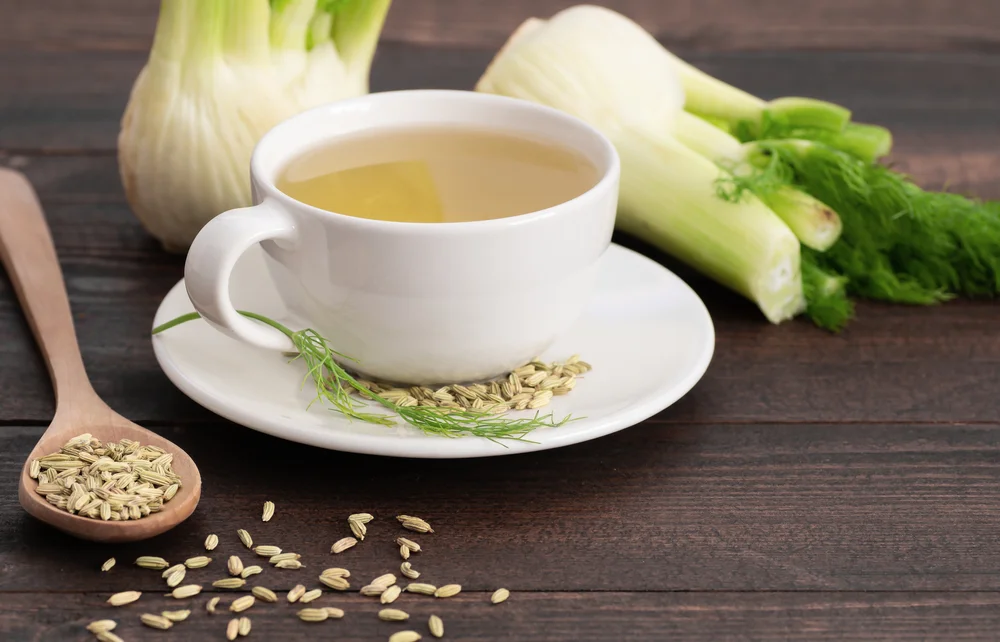What is Fennel Tea?
Fennel tea is an herbal infusion made from the dried fennel seeds, leaves, or bulb of the fennel plant (Foeniculum vulgare). It has a distinct licorice-like aroma and flavour due to the presence of anethole, the primary compound in fennel.
Fennel tea is commonly consumed for its potential health benefits, as fennel is believed to have antioxidant, anti-inflammatory, and digestive properties. The tea is made by steeping crushed fennel seeds or other parts of the plant in hot water, allowing the beneficial compounds and flavours to infuse into the liquid. It can also be enjoyed hot or cold and may be sweetened with honey or lemon if you like!
Nutritional Profile of Fennel
Fennel is more than just a flavourful herb – it packs a nutritional punch too. This aromatic plant is loaded with vitamins, minerals, and unique compounds that make it a healthy addition to your diet.
- Vitamin C
- Potassium
- Folate
- Manganese
- Fibre
For starters, fennel is a good source of vitamin C, which boosts your immune system and keeps your skin glowing. It contains potassium, a mineral that helps to regulate blood pressure and keeps your muscles functioning properly. It also contains folate, a B-vitamin that’s needed for cell growth and development.
Fennel also provides manganese, a mineral involved in metabolism and antioxidant defences. And if you’re looking to up your fibre intake, using the bulb and seeds of fennel are a good option. They help to keep your digestion regular and you’ll feel fuller for longer.
Fennel is also a source of powerful antioxidants like quercetin and limonene, which help to neutralise harmful free radicals and reduce oxidative stress in the body. Phenolic compounds like rosmarinic acid and caffeic acid also exhibit antioxidant and anti-inflammatory properties.
Digestive Health Benefits
Many cultures have actually turned to fennel as a natural remedy for an upset stomach. There’s a reason why this herb has been used for centuries as a carminative (i.e. a substance that helps reduce gas). So, if you’re someone who struggles with occasional tummy troubles, fennel tea might just become your new best friend.
Fennel contains compounds like anethole, fenchone, and estragole that can help relax those digestive muscles and reduce spasms in the gut. This can help things to move along more smoothly and prevent that uncomfortable bloating or gas that appears after a big meal.
It can also help prevent indigestion from happening in the first place. The tea seems to help in the production of digestive juices like bile, which helps to break down fats more effectively. It may also have an anti-inflammatory effect on the gut lining, soothing any irritation that could lead to indigestion.
Weight Management Support
The fibre and water content in fennel can provide feelings of fullness, making it easier to say “no†to those mid-meal snacks. Additionally, fennel’s anethole compound is thought to have a mild appetite-suppressing effect. Fennel tea may also give your metabolism a little boost. Some suggest that the herb’s oils could increase the rate at which your body burns calories, even while at rest. It is also a source of vitamin- B6 which helps to convert carbohydrates and proteins into glucose and amino acids.
Of course, no single food or drink is a magic weight loss solution. But when combined with a balanced diet and regular exercise, sipping on some fennel tea could help you on your weight-loss journey.
Immune System Support
Fennel is loaded with vitamin C – an essential nutrient for immune function. Just one cup of fennel tea can provide a decent dose of this vital antioxidant that helps to support your body’s fight against infections and illnesses. The herb is also rich in other antioxidants like quercetin and limonene, which help reduce inflammation. Fennel tea also contains antimicrobial compounds like anethole that may help fight off nasty pathogens like bacteria, viruses, and fungi before they can make you sick. Some traditional medicine systems like Ayurveda have long used fennel to help prevent and treat respiratory issues like coughs, colds, and congestion.
Anti-Inflammatory Properties
Research suggests fennel’s anti-inflammatory effects could help ease the joint pain and swelling that’s associated with osteoarthritis and rheumatoid arthritis. Some people also use fennel tea to manage asthma symptoms by reducing airway inflammation. The herb has also been studied for its ability to protect against inflammation-driven diseases like cancer, neurodegenerative conditions, and metabolic disorders like obesity and type 2 diabetes.
Skin and Hair Benefits
Oxidative stress and inflammation are two major contributors to premature skin ageing and, as mentioned earlier, fennel is loaded with antioxidants like Vitamin C and other phenolic compounds that can combat these two factors. Fennel’s anti-inflammatory properties may also make it useful for certain skin conditions like eczema or psoriasis. Although more research is still needed, the herb’s soothing effects could potentially reduce redness, itching, and other symptoms. Some believe fennel tea can also help to reduce the appearance of fine lines and wrinkles.
Fennel has long been used in traditional hair care practices, and for good reason. It’s a rich source of nutrients like zinc, vitamin C, and follicle-stimulating amino acids that support healthy hair growth. Using cooled down fennel tea as a pre-shampoo rinse is thought to nourish the scalp and strands from root to tip. And with its natural antimicrobial properties, fennel tea may help to keep scalp irritation and dandruff at bay.
How to Prepare Fennel Tea
Brewing your own fragrant cup of fennel tea is easier than you might think!
To make fennel tea, you’ll need:
- 1-2 teaspoons of fennel seeds (or 1-2 fennel tea bags)
- 1 cup of water
- Honey or lemon (optional)
Here’s how to do it:
- Bring your cup of water to a boil in a small saucepan or kettle.
- If using fennel seeds, lightly crush them with a pestle and mortar or the back of a spoon to help release their oils and flavours.
- Place the fennel seeds or tea bag(s) in a mug or teapot.
- Once the water reaches a full boil, remove from heat and carefully pour it over the fennel.
- Allow the tea to steep for 5-7 minutes to extract maximum flavour and beneficial compounds!
- Strain the tea through a fine mesh strainer to remove any seeds.
And that’s it – your fresh fennel tea is ready to enjoy!
You can also experiment with other herbs or spices. For example, you could add a few slices of fresh ginger to provide an extra inflammatory boost, or maybe cinnamon or cardamom for a warm, cosier tea taste.
Considerations
Fennel tea is generally regarded as safe for most people when consumed in moderation. However, there are some potential side effects to be aware of.
Fennel contains compounds called estragole and anethole that may have antiestrogenic effects. For this reason, fennel tea is not recommended for women with hormone-sensitive conditions like breast cancer, uterine cancer, or endometriosis unless it’s approved by their doctor. It’s also advised to avoid fennel tea during pregnancy and breastfeeding.
There is also a possibility that fennel can interact with certain medications like birth control pills and some antidepressants and anti-anxiety medications. The herb may increase the risk of side effects or decrease the drug’s efficacy. If you take any prescription medications, it’s best to consult your doctor or a pharmacist before adding fennel tea to your routine.
Overconsumption of fennel tea may also cause side effects like nausea, vomiting, and difficulty passing urine in some individuals. Moderation is key, with most experts suggesting keeping fennel tea intake to less than 4 cups per day.
For those with diabetes, it’s important to note that fennel has been shown to potentially lower blood sugar levels. If you have diabetes and want to incorporate fennel tea, be sure to monitor your blood sugar closely and adjust medications accordingly.
As with any herbal supplement or botanical, it’s always a good idea to consult your healthcare provider before adding fennel tea to your diet, especially if you have an existing medical condition or are taking medications. They can provide personalised guidance and ensure fennel tea doesn’t interfere with any treatments.
Related articles: The Surprising Benefits Of A Daily Cup Of Tea













